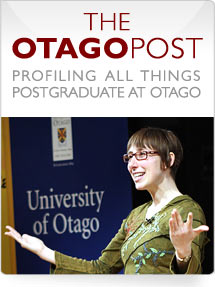 Thursday 28 April 2016 12:10pmThe Otago Post issue 9
Thursday 28 April 2016 12:10pmThe Otago Post issue 9Giving scholars no more than ten minutes to present their research might pose a challenge to many, but at the University's inaugural Hui Poutama in August, Māori academic staff willingly shared their work with fast-talking and often humourous results, some trying hard at times to ignore the prompt card to “Finish NOW”.
Associate Professor John Broughton, hui organising committee chairperson, said they needed to conceive a format in which as many people as possible could present their research within a day. The upshot was a 'pecha kucha' – Japanese for 'chit chat' – format, where each presenter talks to 20 slides for 20 seconds each. Twelve staff took up the 20/20 challenge, with another thirteen allocated 15 minutes (a 10 minute presentation with 5 minutes to field questions) to present their mahi.
The hui theme was “Past Present Future”, and it was Dr Catherine Savage, Kaihautū/Interim Manager of Te Tapuae o Rehua, who laid down the challenge in her keynote address. It's time, she said, for Māori to contribute to the sustainability of our communities through a pedagogy of transformation. Dr Savage went on to explain that higher education should serve not just as a source of economic growth, but also as society's critic and conscience. We must, she said, question failures in the educational system and 'be conscious' in order to make continual, positive contributions. The Hui Poutama showed that Otago staff are teaching, researching, working to, and personally embracing the principles of transformational sustainability.
“There isn't one Māori way,” commented one presenter, and the scope of presenters' research methodologies and application of their findings in communities around the country amply demonstrated this.
Values intrinsic to the physical, cultural, emotional and spiritual sustenance of Māori - whakawhanaungatanga, kaupapa Māori, tikanga, connection and relationships - were highlighted by participants from varied disciplines, teaching and research areas. Presenters frequently commented that their research evolved from personal, whānau and hapū experience. Topics included a genetic variation carried down through generations in one whānau; the loss of te reo for one small Kāi Tahu community; and the provision of dental services respectful of the values of tapu and noa.
Giving back to communities and promoting the health and wellbeing of all Māori (and the nation's development) were the foundation for other research areas such as computer modelling the sustainability of the tītī resource; iwi management planning; diabetes and dietary studies; and health workforce development.
The contribution that the University of Otago and its Māori academic staff are making to cultural capital and the sustainability of the wider community was evidence that Dr Savage's challenge is being taken up, and our postgraduate cohort's work is also responding to Dr Savage's 'transformative pedagogy'. The next Hui Poutama will undoubtedly amplify this response.
